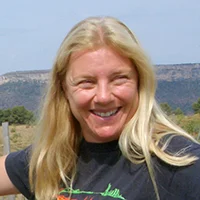Daphne Glorian
Grower/Winemaker
Clos Erasmus & Laurel
Priorat, Spain
Spotlight No. 10
Imagine being a petite blonde woman amidst a bunch of crazy guys in a great adventure to grow grapes and make wine in a desolate, all-but-forgotten place. In the beginning, they did everything together. They had their own plots but they tended them together. They would all pile into René Barbier’s old minivan and bounce up and down through the landscape, taking care of each vineyard one by one. They were mavericks, and Daphne Glorian proved that women can hang with the best of them.
Daphne’s first wine, Clos Erasmus, is named after the Dutch Renaissance theologian Desiderius Erasmus. His ideas were so much a part of family discussion at the dinner table when she was little that she grew up thinking he was part of the family. Erasmus’ ideas, such as “There are some people who live in a dream world, and there are some who face reality; and then there are those who turn one into the other,” inspired her own philosophy that life comes down to chance, opportunity and a sense of adventure, which she seized when she was invited to join the guys in the Priorat. And now she is making one of the top wines in the world.
Despite Daphne’s ability to run with a male pack, her wines are decidedly feminine. While most winemakers in the Priorat make wines from the two autochthonous grapes, Carignan and Grenache, Daphne decided to plant Grenache and Syrah. She feels Carignan from cooler climates is better, and Gratallops is really hot. But she likes Grenache because “it is the Pinot Noir of the south, is perfectly adapted to the climate and has a temperament that I love in wine.” And Syrah “adds complexity, with its bacon fat, white pepper and violet notes.” Both grapes have a soft, round, feminine sensibility to them. “Sexy and amazing complexity and length” were the words The Wine Advocate used to describe Clos Erasmus 2004 the year she received the coveted 100 points. (She also planted Cabernet because at the time everyone thought they should, and she has no regrets.)
Early on, Daphne opted to practice biodynamics, not because it was popular but because it made sense. She prefers to eat fresh, organic foods and wants the same from the things she drinks, including wine. And she has witnessed the benefits to the vineyards from the extra work. She prefers to put energy into the vineyards rather than into manipulations in the cellar. Daphne’s philosophy is to “let the grapes live their own life. The grapes balance themselves and naturally become wine. They are domesticated and so eager to please.” But I wondered, not having studied enology, was she afraid at first? The truth is that in the first vintage she was scared to death, but she learned by necessity, kind of like parents do; she instinctively learned how to nurture her grapes as they fermented into wine.
The day I was with Daphne, she happened to have a bottle of the 2009 Erasmus left open from a few days before and we tasted it. Not only was it still good, but the aromas moved in circles, not linearly the way they usually come up from the glass. It was something I had never experienced before. It was energetic, expressive, engaging — it was Daphne!


